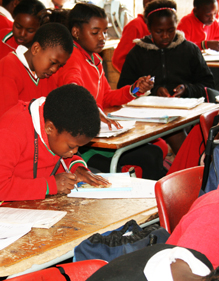
Media professionals are free to use all copy and photographs from this series on condition Corruption Watch is credited as the source.
The Special Investigating Unit’s probe into 22 Limpopo education department officials ranges from negligence on the part of tender adjudication committee members, to irregular or inflated payments to several service providers.
The alleged questionable transactions involved among others EduSolutions, Aurecon Joint Venture, and a payment of R15-million to an unnamed “foreign entity with zero rating status”.
These dealings seemingly bled the department dry, resulting in it already having spent its 2012/13 budget by the beginning of this year – which meant no money for textbooks.
Limpopo illustrated what a plethora of reports, by the national education department and by the auditor-general, had been saying for some time: poor monitoring was leading to exploitation of the system.
Academic Laurence Wright’s recently released book Eastern Cape Education Crisis shows in detail how in that province, corruption entered into every aspect of the procurement and delivery of textbooks, and reveals the serious impact this had on service delivery.
One stationery supplier, known to Corruption Watch, is common to both provinces and presently part of the Limpopo investigation.
“Corruption in education has flourished because there are large sums of money floating around through tenders and if you are intent on stealing money, it would not be that difficult because of a lack of government capacity and skills to conduct oversight,” said Mark Heywood, spokesperson of rights group Section27.
Corruption Watch director David Lewis agrees, adding that the situation in Limpopo, as revealed by Anis Karodia’s report, indicated a lack of qualified staff in the provincial education department and “extraordinary levels of financial mismanagement and wasteful expenditure”.
Karodia is the former education administrator of Limpopo.
“He (Karodia) said that a total of R2.6-billion had been misappropriated from the Limpopo education department’s budget … of particular interest is his conclusion that the bid adjudication committee is not competent or sufficiently well trained to deal with mammoth tenders.”
Looking at Karodia’s report, Lewis said it does not seem that the administrator believed value for money was received from deals with EduSolutions or multinational project management company Aurecon.
Karodia also felt the tenders strongly benefited the companies involved.
Aurecon is alleged to have been awarded a R95-million contract to fast-track education infrastructure projects, when the lowest bid was R26-million. That being said, the firm recently said on Carte Blanche that it believes it was awarded the contract based on its ability to provide a good service. A similar argument has been put forward by EduSolutions.
Government and civil society’s response: what’s significant?
What’s interesting about the Limpopo textbook crisis is that it spurred wide-scale cooperation between civil society organisations, but these same groups were already involved individually in education cases in other provinces.
Section27 – which has already proved its strength and set up networks through an associatedorganisation, the Treatment Action Campaign – was able to mobilise support and gain access to principals and senior officials quickly enough to launch urgent court action.
Sarah Sephton of the Legal Resources Centre said Limpopo caused a ripple effect, with much-needed attention being turned to problems in education departments in other provinces.
The strong intervention by civil society prompted Cosatu general secretary Zwelinzima Vavi to question earlier in August why trade unions were not more actively involved in both education and health issues.
Knock-on effects
If not urgently addressed the Limpopo crisis will see at least two years of matric students devastatingly ill-equipped for exams.
This year the province’s grade 12s were only affected by the lack of textbook top-ups, but they were able to use existing textbooks from the previous year as the curriculum was the same.
But next year the new curriculum is extended to grades 4 to 9, and grades 11 and 12, and all these grades will need new textbooks – a matter of grave concern considering the education department has already exhausted its 2012/13 budget.
The Limpopo crisis revealed real delivery flaws in a system as well as the failure by the national basic education department, treasury and presidency to act on a whistleblower’s detailed information long before the process escalated.
“It’s important that this case creates accountability,” said Heywood. “There is still some way to go, but that is the only way the health issues were addressed.”
Coming up
Next week we’ll examine the Limpopo textbook contract against the requirements of the Public Finance Management Act and other tender regulations, highlighting the “irregularities” that have characterised this particular deal. We’ll also explore the remedial measures available to correct and punish such irregularities.

